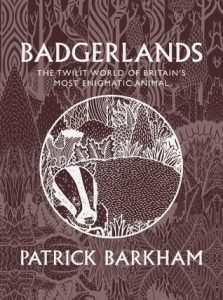Read a Wild Book was one of my aims this month. I mainly read The Saffron Trail, which was fairly wild, but not what I had in mind for a wild book. My BTO magazine this month had some more suggestions for me, as well as an article by the excellent Chris Packham on why wildlife is good for our mental health. I have more climate change related books on my shelf than natural history (apart from guidebooks), but added Mark Cocker’s new(ish) one anyway – Our Place.
You’ll also find my thematic Fiction in Fifty piece for the month at the end!
Read a Wild Book
Regular readers will know that I go through the list of books on my to-read list occasionally, trimming them down when I wonder why I put them there in the first place. This is effectively a check on my to-read list of any that I can class as a wild book… and why you might want to read them too.
Books on my ‘read’ list I recommend to you
 Badgerlands
Badgerlands
by Patrick Barkham
Patrick Barkham’s quest to really understand the badger and the part he plays in English culture takes him and us to some dark and dangerous places, as well as beautiful crepuscular places deep in the countryside, lyrically described so the moss, cuckoo and scent-marking assault your senses. He brings a fascinating journalistic approach to every aspect from pre-history and literature to rescued animals and the great badger-cull fiasco of 2012. Well, he actually finishes with the resurgence of badgers in Norfolk.
![]() Update: The Badger cull scandal continues – they’re trying to do it again, and wider…
Update: The Badger cull scandal continues – they’re trying to do it again, and wider…
Treasure (Seed Savers series)
by Sandy Smith
Treasure and its sequels, Lily, Heirloom, and Keeper, are important stories for younger teens. Set in a world where food is produced in cubes, and all food production is the concern of agrochemical businesses, Sandy Smith finds hope for humanity – an underground organisation that is encouraging people to grow real food. This is a world which is all too real. Read the series and fight for your rights for real food.
![]() Update: Recently released by a new publisher with beautiful new covers!
Update: Recently released by a new publisher with beautiful new covers!
The Edible Garden
by Alys Fowler
![]() This might be a gardening book, rather than a wild book, but it also might be a cook book, except it has too few recipes for the glorious foods she produces from her ‘grow it wherever it likes’ garden. But it also gives you links to people who specialise in some of the tasks, especially for food preservation. A book that shows you what you could do rather than telling you how to do it. Inspirational, but maybe needs more to help us act, too.
This might be a gardening book, rather than a wild book, but it also might be a cook book, except it has too few recipes for the glorious foods she produces from her ‘grow it wherever it likes’ garden. But it also gives you links to people who specialise in some of the tasks, especially for food preservation. A book that shows you what you could do rather than telling you how to do it. Inspirational, but maybe needs more to help us act, too.
Books on my To-Read list that I ought to read first!
Owls: Our most Fascinating Birds
by Matt Sewell
In this beautiful follow-up to Our Garden Birds, Our Songbirds and Our Woodland Birds, street artist Matt Sewell captures the world’s most evocative bird: the owl. In his much-loved pop-art watercolours and accompanied with his whimsical descriptions, Matt Sewell expresses the individual characters of owls as never before. [goodreads]
 Crow Country
Crow Country
by Mark Cocker
One night Mark Cocker followed the roiling, deafening flock of rooks and jackdaws which regularly passed over his Norfolk home on their way to roost in the Yare valley. From the moment he watched the multitudes blossom as a mysterious dark flower above the night woods, these gloriously commonplace birds were unsheathed entirely from their ordinariness. They became for Cocker a fixation and a way of life. [goodreads]
I went on a wildlife writing course with Mark Cocker and I’m surprised I didn’t put this on my list much, much earlier.
Our Place: Can we save Britain’s wildlife before it’s too late?
by Mark Cocker
…This is a book that looks to the future as well as exploring the past. It asks searching questions like who owns the land and why? And who benefits from green policies? Above all it attempts to solve a puzzle: why do the British seem to love their countryside more than almost any other nation, yet they have come to live amid one of the most denatured landscapes on Earth?…[goodreads]
Fingers in the Sparkle Jar
by Chris Packham
Every minute was magical, every single thing it did was fascinating and everything it didn’t do was equally wondrous, and to be sat there, with a Kestrel, a real live Kestrel, my own real live Kestrel on my wrist! I felt like I’d climbed through a hole in heaven’s fence.[goodreads]
Running Hare: The Secret Life of Farmland
by John Lewis-Stemple
Traditional ploughland is disappearing. Seven cornfield flowers have become extinct in the last twenty years. Once abundant, the corn bunting and the lapwing are on the Red List. The corncrake is all but extinct in England. And the hare is running for its life. [goodreads]
The Transition Handbook: from oil dependency to local resilience
by Rob Hopkins
This is a book I’ve had on my bookshelf for years, bought when I was full of enthusiasm for the transition movement. Reading the blurb and comments from reviewers now, I think it has dated badly, but the new edition The Transition Companion, is recommended as being much better.
That’s my #30DaysWild Challenge done – now for #Fi50
It’s the last day of 30 Days Wild. I’m going to do something really wild more often, and hope you find more time for wildlife in your day too. It’s surprising what you see once you’re tuned into it. I’ll have some more detailed thoughts on the month on Monday.
Meanwhile, there is one more thing I have to do this month. I’m cutting it fine, but it’s the Fiction in Fifty words, hosted by the Ninja Librarian. The prompt this month is… 🙂
Cutting it Fine
 Ten minutes to midnight. “Plenty of coal worldwide. Carry on.”
Ten minutes to midnight. “Plenty of coal worldwide. Carry on.”
One minute to midnight. “Coal and oil extraction ruin the environment? Rise in global temperatures? Load of lies.”
Ten seconds to midnight. “Sea levels threaten nearly all world capitals…”
…Swiss, Ecuadorians, Nepalese, Afghans, Peruvians and Kazakhs watch the map change.
© J M Pett 2018



Congratulations on a month of entertaining and informative posts! The fiction at the end chimes in with what I always say – how can you be 100% sure climate change theories are not correct? Wouldn’t it still be good to do things that are good for the planet – just in case? At 10 seconds to midnight it’s probably too late.
Great set of books to look at, and great Fi50. I guess it was a prophetic prompt, if you saw mine (many hours late).